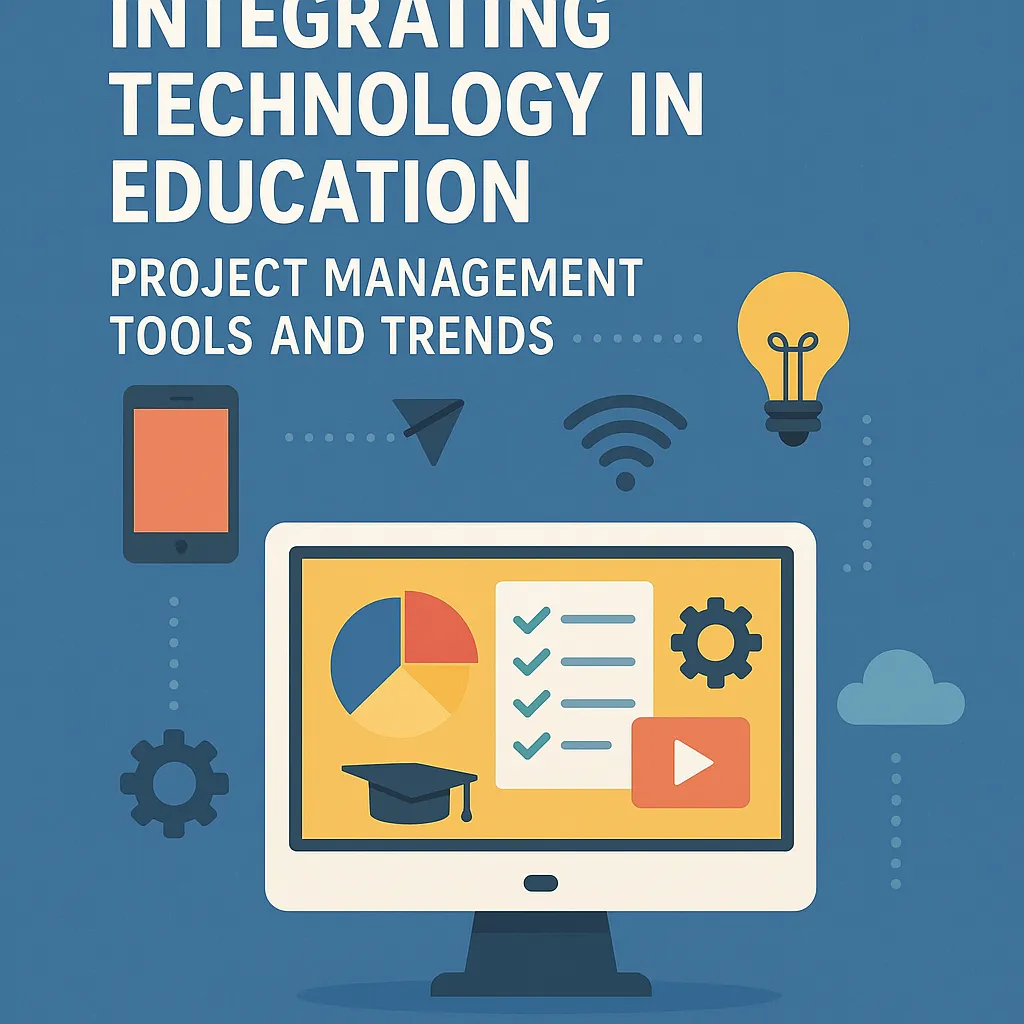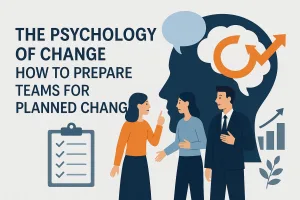Introduction
The role of an education project manager has become increasingly vital. Education project management refers to the discipline of planning, executing, and overseeing projects within educational institutions, aimed at achieving specific learning outcomes and objectives. This complex process requires a diverse skill set, including the ability to coordinate with various stakeholders, manage resources effectively, and ensure that projects align with educational goals [14].
As educational environments become more technology-driven, the integration of technology into project management practices is essential. Technology enhances project management efficiency by providing tools that facilitate better planning, execution, and monitoring of projects. These tools not only streamline communication among team members but also enable project managers to track progress in real-time, making it easier to adapt to changes and challenges as they arise [10][15].
This blog will delve into the latest technological tools and trends that are transforming project management in education. We will explore how these innovations can help education project managers and IT specialists enhance their workflows, improve collaboration, and ultimately achieve better outcomes for students and educational institutions alike. By understanding the current landscape of technology in education project management, professionals can better equip themselves to navigate the complexities of their roles and drive successful project implementations.
Current Challenges in Education Project Management
Education project managers face a unique set of challenges that can significantly impact the success of their initiatives. However, the integration of technology can provide effective solutions to these issues. Here are some of the common challenges and how technology can help address them:
- Resource Allocation and Management: One of the primary challenges in education project management is the effective allocation and management of resources. This includes not only financial resources but also human resources and materials. Technology can streamline this process through advanced project management tools that allow for real-time tracking of resource usage, budget management, and forecasting needs. By utilizing software that provides insights into resource allocation, project managers can make informed decisions and optimize their resources more effectively [1].
- Communication Barriers Among Stakeholders: Effective communication is crucial in any project, but in the educational context, it can be particularly challenging due to the diverse range of stakeholders involved, including teachers, administrators, students, and parents. Technology can bridge these communication gaps by providing platforms for collaboration and information sharing. Tools such as project management software, messaging apps, and video conferencing can facilitate clearer communication, ensuring that all stakeholders are on the same page and can contribute to the project’s success [2].
- Time Constraints and Project Deadlines: Education project managers often operate under tight deadlines, which can lead to stress and reduced project quality. Technology can assist in managing time constraints by automating scheduling, reminders, and task assignments. Project management tools can help in setting realistic timelines, tracking progress, and adjusting plans as necessary to meet deadlines without compromising the quality of the educational outcomes [3].
- Tracking and Reporting Project Progress: Monitoring the progress of educational projects is essential for ensuring that objectives are met and for making necessary adjustments along the way. However, traditional methods of tracking can be cumbersome and time-consuming. Technology offers solutions such as dashboards and reporting tools that provide real-time data on project status. These tools can help project managers quickly identify areas that need attention, assess performance against goals, and communicate progress to stakeholders effectively [4].
By addressing these challenges through the integration of technology, education project managers can enhance their efficiency and effectiveness, ultimately leading to more successful educational initiatives.
Emerging Technology Trends in Education Project Management
In the rapidly evolving landscape of education project management, technology plays a pivotal role in enhancing efficiency and effectiveness. Here are some of the latest technological trends that are shaping the field:
- The Rise of Cloud-Based Project Management Tools: Cloud computing is becoming increasingly prevalent in educational institutions, allowing for seamless collaboration and communication among project teams. These tools enable real-time sharing of documents, discussions, and media, which is particularly beneficial in remote and hybrid learning environments. By 2025, it is expected that more schools will adopt cloud-based systems due to their cost-effectiveness and scalability, providing specialized tools tailored for educational needs [1][2].
- The Impact of Data Analytics on Decision-Making: As educational institutions generate vast amounts of data, the focus on data analytics has intensified. This trend allows project managers to leverage data for informed decision-making, helping to identify early signs of project challenges and measure progress effectively. The increasing emphasis on data-driven project management is transforming how educational projects are planned and executed, ensuring that strategies are based on solid evidence rather than assumptions [6][8].
- The Role of Artificial Intelligence (AI) in Project Forecasting: AI is revolutionizing project management by providing tools that can tailor educational content and pacing to individual needs. In the context of project management, AI can assist in forecasting project timelines and resource allocation, allowing project managers to devote more time to strategic planning and stakeholder engagement. The integration of AI into project management processes is expected to enhance the overall efficiency and effectiveness of educational projects [9][15].
- Incorporation of Mobile Technology for On-the-Go Management: The proliferation of mobile technology has made it easier for education project managers to oversee projects from anywhere. Mobile applications facilitate communication, task management, and real-time updates, ensuring that project teams remain connected and informed regardless of their location. This trend is particularly important in the context of education, where flexibility and accessibility are crucial for successful project execution [1][3].
Essential Tools for Education Project Managers
Project managers are increasingly turning to technology to enhance their project management practices. The integration of various tools not only streamlines processes but also fosters collaboration and efficiency among teams. Here’s a curated list of essential technology tools that education project managers and IT specialists can leverage to improve their project management efforts.
Project Management Software
- Trello: A highly visual, web-based tool that organizes projects into boards, making it easy to track progress and manage tasks effectively. Its intuitive interface allows for easy collaboration among team members.
- Asana: This platform facilitates task allocation and project visibility, enabling teams to manage their workload efficiently. Asana’s features support tracking project milestones and deadlines, ensuring timely completion.
- Microsoft Project: A powerful tool designed to help plan and track project progress. It offers flexibility and simplicity, making it suitable for various project sizes and complexities.
Collaboration Tools
- Slack: A communication platform that enhances team collaboration through channels, direct messaging, and file sharing. It integrates with various project management tools, allowing for seamless communication.
- Microsoft Teams: This tool combines workplace chat, video meetings, and file collaboration, making it an all-in-one solution for project teams. Its integration with other Microsoft products enhances productivity.
- Google Workspace: A suite of cloud-based tools that includes Google Docs, Sheets, and Drive, facilitating real-time collaboration and document sharing among team members.
Time Management Applications
- Clockify: A time tracking tool that helps project managers monitor how time is spent on various tasks. It provides insights into productivity and helps in resource allocation.
- Toggl: Another popular time tracking application that offers simple tracking features and detailed reporting, allowing project managers to analyze time usage and improve efficiency.
Budgeting and Financial Tracking Tools
- QuickBooks: A comprehensive accounting software that helps project managers track budgets, expenses, and financial reports. It simplifies financial management and ensures projects stay within budget.
- Expensify: This tool streamlines expense reporting and tracking, making it easier for project managers to manage project-related expenses and reimbursements.
Learning Management Systems (LMS) Integration
Integrating project management tools with Learning Management Systems (LMS) can significantly enhance the educational project management process. This integration allows for better tracking of educational initiatives, resource allocation, and communication between educators and project teams. It ensures that all stakeholders are aligned and can access necessary materials and updates in real-time.
By utilizing these essential tools, education project managers can enhance their project management practices, leading to more successful educational initiatives. The right combination of project management software, collaboration tools, time management applications, budgeting tools, and LMS integration can create a robust framework for managing educational projects effectively.
Successful Case Studies of Technology Integration
The integration of technology has proven to be a game-changer, enhancing efficiency, communication, and overall project outcomes. Below are three compelling case studies that illustrate successful technology integration in educational projects.
Case Study 1: Implementation of a Cloud-Based Tool for a District-Wide Curriculum Project
A notable example of technology integration is the implementation of a cloud-based project management tool across a school district. This initiative aimed to streamline the development and deployment of a new curriculum. Key outcomes included:
- Centralized Access: The cloud-based platform allowed educators and administrators to access curriculum resources and project updates in real-time, fostering collaboration and transparency.
- Improved Coordination: With all stakeholders on the same platform, coordination among teachers, curriculum developers, and project managers improved significantly, leading to a more cohesive curriculum rollout.
- Data-Driven Decisions: The tool provided analytics that helped project managers assess progress and make informed decisions, ultimately enhancing the curriculum’s effectiveness and alignment with educational standards [1].
Case Study 2: Using Data Analytics for Improving Student Engagement in Projects
Another successful integration of technology can be seen in the use of data analytics to enhance student engagement in educational projects. This case study focused on a specific initiative aimed at increasing participation in STEM programs. The key aspects included:
- Real-Time Feedback: By utilizing data analytics tools, educators could track student engagement levels in real-time, allowing for immediate adjustments to project activities to better meet student needs.
- Targeted Interventions: The data collected enabled project managers to identify trends and patterns in student participation, leading to targeted interventions that increased overall engagement and interest in STEM subjects.
- Outcome Measurement: The analytics also provided a framework for measuring the success of the initiative, demonstrating a significant increase in student participation and enthusiasm for STEM projects [2].
Case Study 3: Enhancing Communication Through Collaboration Tools During a Major Educational Initiative
Effective communication is crucial in project management, and the integration of collaboration tools has transformed how educational initiatives are executed. This case study highlights a major educational initiative that utilized various collaboration tools to enhance communication among stakeholders. Key points include:
- Streamlined Communication: The use of collaboration platforms allowed for seamless communication between project managers, teachers, and external partners, reducing misunderstandings and delays.
- Document Sharing and Feedback: These tools facilitated easy sharing of documents and resources, enabling real-time feedback and collaborative editing, which improved the quality of project deliverables.
- Increased Engagement: By fostering a collaborative environment, the initiative saw increased engagement from all stakeholders, leading to a more successful implementation of the educational program [3].
Best Practices for Integrating Technology
Integrating technology into education project management can significantly enhance efficiency, collaboration, and overall project outcomes. Here are some best practices that education project managers and IT specialists should consider when selecting and implementing technology tools:
- Assessing Team and Project Needs: Before selecting any technology tools, it is crucial to conduct a thorough assessment of the specific needs of your team and the project at hand. This involves understanding the unique challenges and requirements of your educational environment, which can help in identifying the most suitable tools that align with your objectives. A tailored approach ensures that the technology adopted will effectively address the specific demands of the project and the team’s capabilities [6][12].
- Engaging Stakeholders in Technology Selection: Involving all relevant stakeholders in the technology selection process is essential for successful integration. This includes educators, administrators, IT staff, and even students, as their insights can provide valuable perspectives on what tools will be most effective. Collaborative decision-making fosters a sense of ownership and increases the likelihood of successful adoption, as stakeholders are more likely to embrace tools they had a hand in selecting [7][10].
- Providing Training and Support: To ensure smooth adoption of new technology, it is vital to offer comprehensive training and ongoing support for team members. This can include workshops, tutorials, and access to resources that help users become proficient with the tools. Continuous support not only enhances user confidence but also minimizes resistance to change, leading to a more effective implementation of technology in project management [12][15].
- Continuously Evaluating Technology Performance: After implementation, it is important to regularly evaluate the performance of the technology tools in use. Gathering user feedback and assessing how well the tools meet project goals can provide insights into their effectiveness. This ongoing evaluation allows project managers to make informed decisions about whether to continue using certain tools, modify their usage, or explore new options that may better serve the project’s needs [11][14].
By following these best practices, education project managers can effectively integrate technology into their project management processes, leading to improved collaboration, enhanced learning experiences, and successful project outcomes.
Future Outlook: The Evolution of Technology in Education Project Management
The integration of technology is reshaping how education project managers operate, and several key trends are emerging that will significantly influence the future of project management in education.
The Role of Virtual and Augmented Reality in Educational Projects
Virtual Reality (VR) and Augmented Reality (AR) are becoming increasingly important in educational settings. These technologies offer immersive learning experiences that can enhance student engagement and understanding. For project managers, incorporating VR and AR into educational projects can facilitate innovative teaching methods and create interactive environments that support collaborative learning. As these technologies become more accessible, their integration into educational project management will likely become a standard practice, allowing for more dynamic and effective learning experiences [8].
Future Advancements in AI and Automation
Artificial Intelligence (AI) is set to revolutionize education project management by tailoring educational content to meet individual student needs. AI can automate administrative tasks, allowing project managers to focus on strategic planning and execution. The use of AI-driven analytics can provide insights into project performance, helping managers make data-informed decisions. As AI technology continues to advance, its application in education will likely expand, leading to more personalized and efficient project management processes [7][10].
Predictions for Remote Project Management Post-Pandemic
The COVID-19 pandemic has accelerated the adoption of remote project management tools in education. As educational institutions continue to embrace hybrid and remote learning models, project managers will need to adapt to new ways of collaborating and communicating. Tools that facilitate virtual collaboration, such as project management software and communication platforms, will become essential. The future will likely see a blend of in-person and remote project management strategies, requiring education project managers to be proficient in both traditional and digital tools [11].
The Importance of Cybersecurity in Education Technology Tools
With the increasing reliance on technology in education, cybersecurity has become a critical concern. Education project managers must prioritize the security of digital tools and platforms to protect sensitive student data and maintain the integrity of educational projects. As cyber threats evolve, so too must the strategies for safeguarding educational technology. This includes implementing robust security measures and ensuring compliance with data protection regulations. The focus on cybersecurity will be paramount as educational institutions continue to integrate technology into their operations [12].
Conclusion
The integration of technology into project management has become not just beneficial but essential. The use of advanced tools and software can significantly enhance the efficiency and effectiveness of educational projects, allowing project managers to streamline processes, improve communication, and foster collaboration among stakeholders.
Key takeaways include:
- Importance of Technology: Embracing technology in project management is crucial for adapting to the dynamic needs of educational environments. It enables project managers to better plan, execute, and monitor projects, ensuring that educational initiatives are delivered successfully and meet their intended outcomes [11][15].
- Exploration of New Tools: Education project managers are encouraged to actively explore and implement innovative project management tools. These technologies can facilitate better organization, enhance productivity, and ultimately lead to improved educational experiences for both students and educators [10][12]. By leveraging these tools, project managers can stay ahead of the curve and effectively manage the complexities of educational projects.
By embracing these trends and tools, education project managers can not only enhance their project outcomes but also contribute to a more innovative and effective educational landscape.



